< Deals of the Year 2015: Six Transactions that Made a Big ImpactOther marquee technology firms may be decoupling — Hewlett-Packard Co. split itself in two, and eBay spun off PayPal Holdings — but Michael Dell and his financial backer, Silver Lake Partners, are not following the crowd. The duo agreed in October to join Dell’s computer maker with data storage pioneer EMC Corp. in a deal valued at $65.7 billion. The acquisition by Dell, slated to close in mid-2016, would be the largest in tech industry history. It’s also by far the most leveraged, envisioning up to $50 billion in new debt to create a privately owned Dell-EMC.
Tech analysts were skeptical about the transaction, which marries two 1990s-vintage giants of fixed-location technology with relatively little presence in mobile devices or cloud computing, and some EMC shareholders are demanding changes before they approve it. But a Wall Street in M&A high gear rushed to finance the deal.
Dell tapped Credit Suisse Group, which had arranged financing two years ago when the eponymous founder teamed up with Silver Lake to take his Round Rock, Texas–based company private for $24.9 billion, to repeat the trick. Credit Suisse secured more than enough commitments within two and a half weeks, deal bankers say. Seven other U.S. and European banks lined up as financial advisers to Dell, signaling their willingness to plow cash into the acquisition.
The hard part of the deal, insiders say, was finding alignment among four powerful central personalities: Dell himself, who was determined to remain his own boss after exiting public markets; Silver Lake managing director Egon Durban, whose Menlo Park, California–based firm has grown from a start-up in 1999 to a tech-only powerhouse commanding more than $27 billion; EMC chief executive Joseph Tucci, who has run the Hopkinton, Massachusetts–based company since 2001 and at age 68 was anxious to cement his legacy; and Paul Singer, the activist hedge fund legend whose Elliott Management Corp. owns 2.2 percent of EMC and was pressuring Tucci to spin off his most dynamic subsidiary, virtualization software designer VMware.
Getting this strong-willed quartet to yes fell to JPMorgan Chase & Co. and Morgan Stanley, strategic advisers to Dell and EMC, respectively. Feelers first went out in January, when Singer agreed to what EMC called a nine-month “standstill” in his restructuring campaign.
Nine months later a transaction emerged that gave all the insiders enough of what they wanted. Michael Dell, 50, took a strategic jump away from dependence on the low-margin personal computer market without enslaving himself anew to shareholder tyranny. Tucci handed his company off to Dell, one of the world’s premier operational managers. Singer saw EMC’s 80 percent interest in VMware separated from the mother ship as a tracking stock, and collected a 27 percent premium on the rest of the company. Silver Lake enhanced its position among Silicon Valley’s supersmart money by spending a relatively puny $1 billion. Including the 2013 LBO, it has bought a 25 percent stake in an $80 billion-plus revenue company, Dell-EMC, for $2 billion in equity.
Investors away from the table were less thrilled, however. VMware shares dropped by 17 percent and EMC’s by 8 percent between the deal announcement on October 12 and December 2, largely thanks to plans to convert Virtustream, a less brilliantly performing EMC division, into a 50-50 joint venture between Dell-EMC and VMware. Analysts say this could drag down VMware’s profits. As of early December restive shareholders were waiting to see how Dell and EMC might placate them. The companies’ advisers have substantial incentive to smooth things over. Morgan Stanley stands to reap most of up to $125 million in fees from EMC while Dell shares out as much as $95 million among its coterie of bankers, according to industry tracker Freeman & Co.
2015 Deals of the Year






